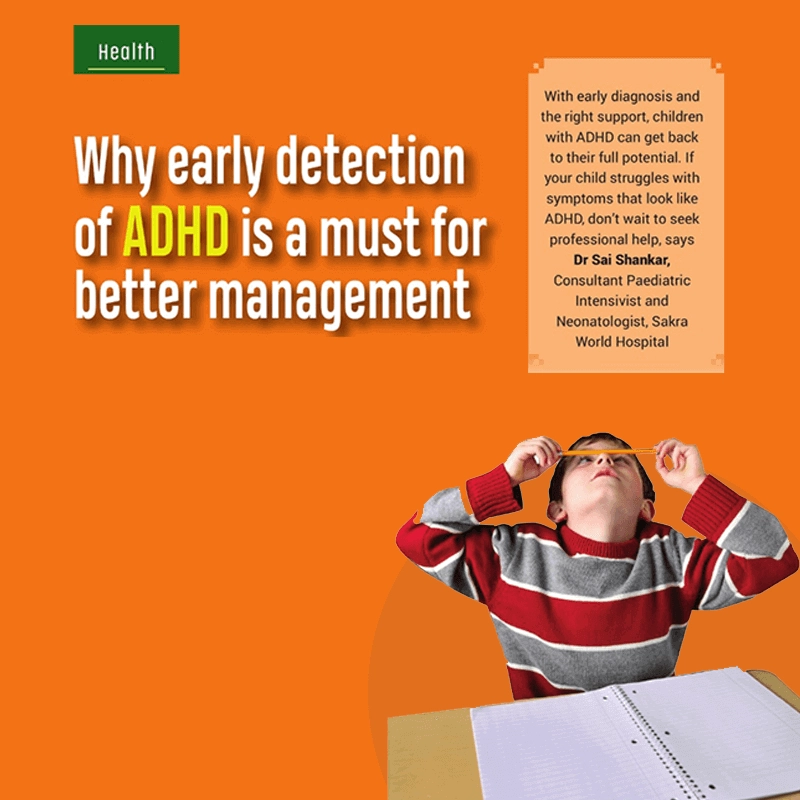Home/Wellness Zone/Sakra Blogs
23rd Jul, 2020

Did you know that Michael Fred Phelps, former American competitive swimmer and one of the most decorated Olympian of all time was diagnosed with Attention Deficit Hyperactivity Disorder (ADHD) at the age of 9 years? While the condition had made it difficult for Michael to deal with school, with appropriate therapy, he was able to manage the symptoms better and swam through his way to success.
ADHD is a neurodevelopmental disorder, usually diagnosed in school-going children and less frequently in pre-schoolers. It affects their ability to pay attention and control impulsive behaviour. A child with ADHD is restless and remains constantly active. They face difficulty in learning, are argumentative and get angry easily. Taking care of a child with ADHD can be difficult, frustrating and often overwhelming.
ADHD is identifiable
Parents often tend to neglect the symptoms as it may be difficult to differentiate between a child with ADHD and a normal but “naughty” kid. Children with ADHD struggle to pay close attention, are unable to follow simple instructions and often do not complete a given task. They also show sudden emotional outbursts, lose their temper easily, lack self-control and stay disorganized. These features are persistent and are seen in more than one setting – for example at school, home and play area and can cause significant disruption in their daily life. If left untreated, this can lead to the development of anxiety and low self-esteem in later life.
It is not all bad news though! With early diagnosis and the right support, children with ADHD can get back to their full potential. If your child struggles with symptoms that look like ADHD, don’t wait to seek professional help. Special attention and guidance from parents and caregivers can help a child to manage themselves, overcoming daily challenges.
Golden rules to manage ADHD
Devise a simple routine and a set of rules that can be easily understood and followed by a child. It is important to understand that the behaviour shown by ADHD children are not intentional. Parents can follow the below-mentioned guidelines:
Maintain a schedule and stick to it – This helps a child to stay focused and organised. Follow daily routines, simplify your child’s schedule and keep your child busy with healthy activities.
Set clear expectations - Make the rules of behaviour simple and explain what will happen when they are obeyed or broke and follow through each time with a reward or a consequence.
Good activity and sleep – Physical exercise helps in better sleep and reduces the symptoms of ADHD. Encourage your child in a sport that they enjoy and suits their strength.
Help your child eat right - Schedule regular healthy meals or snacks and cut back on junk and sugary food.
Teach your child how to make friends- Help him or she becomes a better listener, learns to read people’s faces and body language and to interact more smoothly with others.
Believe in your child – Always believe that your child can learn, change, mature, and succeed in life.
Be positive - Having a positive attitude will allow you to connect with your child and show calm focused behaviour.
Be ready to ask for help - Seek support from doctors, therapists and teachers in nurturing a child with ADHD.
Learn about ADHD – Having knowledge about the condition helps in better management of a child with ADHD. Expand your knowledge about this condition and talk to doctors and therapists to understand steps that can be taken in cases of emergency.
Join a support group - This allows to connect with other parents and families with similar problems.
Medical therapy of ADHD
Mild to moderate symptoms can be managed by behaviour therapy alone. An experienced behavioural therapist can help parents understand the illness and form the rules and guidance required to manage their kids better. In more severe cases, certain drugs which are approved by the FDA are used to mitigate and control distressing symptoms.
Raising a child with ADHD can be difficult. They can be reluctant while obeying orders and follow instructions given by their parents. Positive reinforcement such as rewarding and praising for small achievements help motivate them to follow rules. It becomes essential to understand the impact of your child’s symptoms on the family as a whole. The goal is to meet the challenges with compassion and consistency.
Parents and family members play a great role to help a child with ADHD in managing emotions, attention and behaviour. It is advisable to consult a General Physician or a Paediatrician for further assessment and diagnosis. This will help in developing a behaviour management plan that suits well for your child. One should follow the treatment program and recommended therapy appointments thoroughly.
Enquire Now
